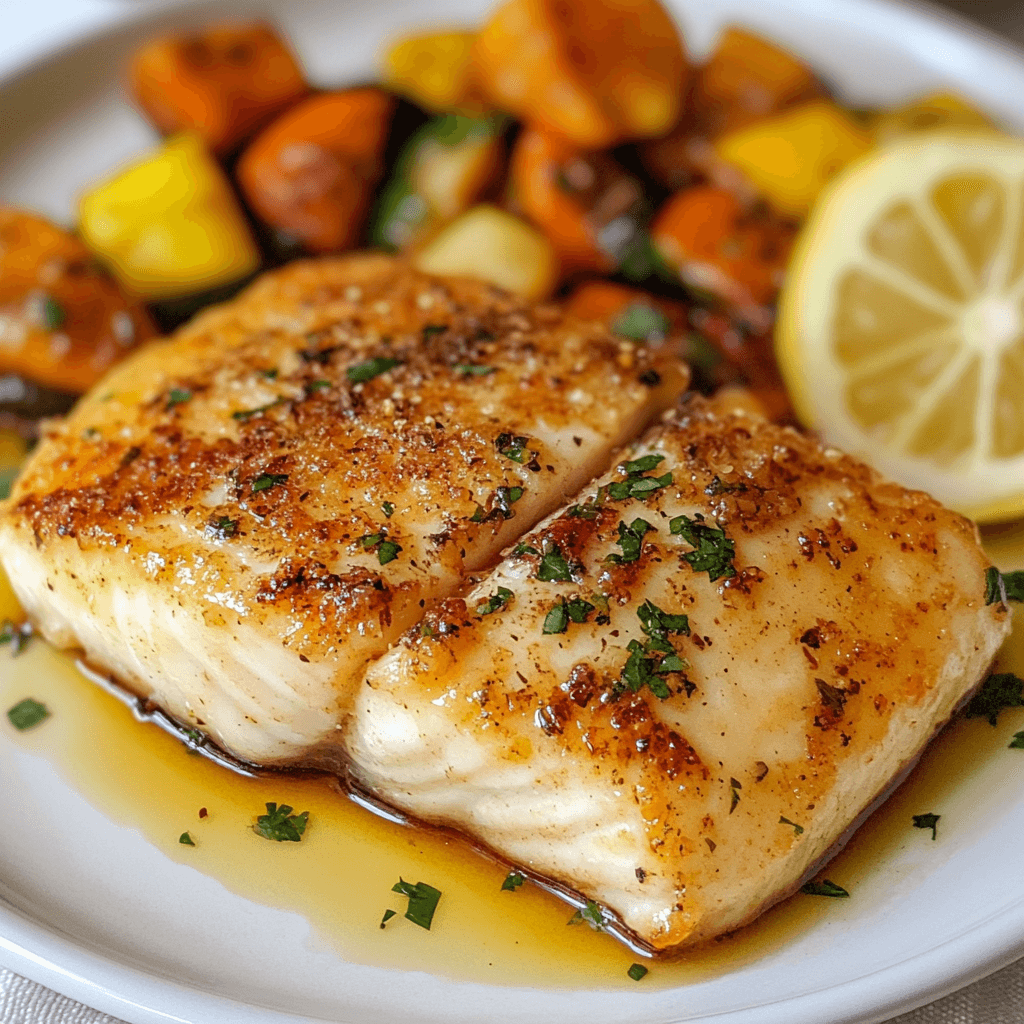If you’re wondering about the “Rockfish vs Halibut taste,” you’re not alone. Many seafood enthusiasts are curious about how these two popular white fish compare in flavor and texture. While both offer mild, sweet profiles, the unique characteristics of each make the Rockfish vs Halibut taste comparison an intriguing topic. This guide will dive deep into the nuances of each fish, helping you make an informed choice for your next meal.
Rockfish is celebrated for its slightly nutty, firm meat, which works well in hearty recipes. On the other hand, halibut offers a buttery, flaky texture ideal for delicate preparations. These differences make the question of rockfish vs halibut taste a fascinating topic, especially for seafood lovers seeking the perfect fish for their meals.
Whether you prefer rockfish or halibut, understanding rockfish vs halibut taste ensures you make informed decisions about flavor and texture, creating dishes that shine on any menu.
Understanding Rockfish
Rockfish is a broad term that encompasses a variety of species, primarily found along the Pacific coast. These fish are known for their distinctive spiny fins and vibrant coloring, which can range from deep reds to golden hues. They inhabit rocky ocean floors, often camouflaging themselves against their surroundings.
Exploring Rockfish Taste and Texture
Rockfish is known for its firm yet flaky texture and mild, slightly nutty flavor, which stands out in hearty recipes. Whether you’re grilling, frying, or baking, its robustness makes it versatile for dishes like stews and tacos. The Rockfish vs Halibut taste debate often hinges on rockfish’s adaptability in recipes requiring bold flavors.
Culinary Uses
Rockfish is a popular ingredient in many coastal cuisines, particularly in the Pacific Northwest, where its versatility and mild flavor make it a favorite among home cooks and chefs alike. This fish is often grilled, fried, or baked, allowing its firm texture to shine in a variety of dishes. It is especially well-suited for fish tacos, adding a hearty bite that pairs perfectly with fresh toppings and zesty sauces. Rockfish also excels in hearty soups and stews, where it holds its shape well, and in comforting casseroles that benefit from its rich, slightly nutty undertone. Its adaptability makes it a reliable choice for countless recipes.
Exploring Halibut
Halibut, on the other hand, is a large flatfish known for its tender, flaky texture and clean taste. This fish is prized worldwide and features prominently in both casual and fine dining menus. Halibut is primarily sourced from the North Pacific and North Atlantic oceans.
Taste and Texture
Halibut boasts a delicate, sweet flavor and an almost creamy texture when cooked. Its flakes are larger and more tender compared to rockfish, offering a melt-in-your-mouth experience. Its mildness allows it to absorb the flavors of marinades and sauces, making it a versatile choice for chefs.
Culinary Uses
Halibut shines in a variety of dishes, including baked or grilled entrees, poached preparations, and even ceviche. It is a popular choice for dishes that call for elegant presentations due to its pristine white flesh and firm structure.
Flavor Profiles: Does Rockfish Taste Like Halibut?
The short answer is: not exactly. While both rockfish and halibut share mild, sweet flavors that make them popular choices, the differences between the two are found in the finer details.
Rockfish: Known for its firmer texture, rockfish has a slightly more pronounced, nutty undertone. This makes it a great option for dishes that call for a hearty bite and a touch of earthiness.
Halibut: With its more delicate, tender, and buttery texture, halibut offers a clean, refined finish. Its luxurious mouthfeel makes it a favorite for lighter, more elegant preparations.
These differences in flavor and texture mean that while rockfish can be used as a substitute for halibut in many recipes, the final dish may have a slightly altered taste and mouthfeel. Each fish brings its own unique qualities to the table, so the choice often depends on personal preference or the desired outcome of the dish.
Texture Comparison
Texture plays a significant role in determining how fish interacts with various cooking methods:
- Rockfish: Its firmness makes it ideal for grilling, frying, and other high-heat methods. The meat retains its shape, making it perfect for stews or tacos.
- Halibut: The delicate, flaky texture of halibut requires more careful handling. It’s well-suited for steaming, baking, and poaching, where the fish can remain moist and tender.
Cooking Methods and Their Influence
Cooking methods greatly influence how rockfish and halibut taste:
Rockfish
- Grilling: Enhances the nutty undertones and adds a smoky flavor.
- Pan-Frying: Creates a crispy crust, locking in its mild sweetness.
- Baking: Preserves moisture and highlights its natural flavors.
Halibut
- Poaching: Keeps the fish moist and allows it to absorb aromatic flavors.
- Baking: Retains the tenderness of the meat while adding a subtle caramelized layer.
- Searing: Creates a crisp golden crust while maintaining a soft, flaky interior.
Nutritional Value
Both rockfish and halibut are excellent sources of lean protein, omega-3 fatty acids, and essential vitamins. Here’s a closer look:
| Nutrient | Rockfish (per 100g) | Halibut (per 100g) |
|---|---|---|
| Protein | 20g | 22g |
| Calories | 90 | 110 |
| Omega-3 Fatty Acids | Moderate | High |
| Fat Content | Low | Low |
| Vitamin D | Good Source | Excellent Source |
While both are healthy choices, halibut has a slight edge in omega-3 content, making it a better choice for heart health.
Exploring the Rockfish vs Halibut Taste Debate
Rockfish
Rockfish is a culinary staple in many coastal regions, particularly in the Pacific Northwest of North America and various parts of Asia. Known for its firm texture and mild flavor, rockfish is incredibly versatile and works well in a variety of cooking methods. Its abundance has made it a cornerstone in traditional dishes such as hearty fish soups, spicy curries, and crispy fried preparations. This adaptability, paired with its affordability, has secured rockfish a prominent place in both home kitchens and casual dining establishments.
Halibut
Halibut, on the other hand, enjoys a more global reputation, often gracing the menus of fine dining restaurants around the world. Its delicate flavor and flaky texture make it a favorite for refined culinary applications. From Mediterranean-inspired dishes like pan-seared halibut with herbs and lemon, to Japanese cuisine where it is used in sashimi and sushi, halibut’s versatility matches its premium status. While it is pricier than many other fish, its luxurious qualities and adaptability across various cuisines make it a sought-after ingredient for those looking to create memorable, elegant meals.
Availability and Cost
Rockfish is often more affordable and accessible compared to halibut, making it a popular choice for everyday meals and budget-friendly recipes. Its availability throughout the year further adds to its appeal, as it can be sourced more easily in many regions. This consistency and cost-effectiveness make rockfish a reliable option for those looking to enjoy fresh seafood without spending a fortune.
Halibut, in contrast, is considered a premium fish and is typically priced higher, particularly when purchased fresh. Its luxurious texture and delicate flavor contribute to its reputation as a high-end seafood option. Additionally, the availability of halibut can be influenced by seasonal factors, as it is more abundant during specific fishing seasons. Outside these times, fresh halibut may become scarcer and even more expensive.
These differences in cost and availability often guide the choice between the two fish. Rockfish serves as an excellent everyday option for a variety of dishes, while halibut is often reserved for special occasions or dishes where its unique qualities can be fully appreciated. Whether you’re seeking affordability and convenience or premium quality and exclusivity, both rockfish and halibut have something distinct to offer.
Popular Recipes
Rockfish Recipes
- Rockfish Tacos: A classic, featuring grilled rockfish with a tangy slaw.
- Pan-Seared Rockfish: Simple and quick, highlighting its natural flavors.
- Rockfish Stew: A hearty dish perfect for colder months.
Halibut Recipes
- Herb-Crusted Halibut: Elegant and flavorful, perfect for dinner parties.
- Poached Halibut in Lemon Butter Sauce: Light and aromatic.
- Halibut Ceviche: A refreshing, citrusy appetizer.
Sustainability Factors
Sustainability is an important consideration when choosing between rockfish and halibut:
- Rockfish: Overfishing has led to some species being endangered. However, sustainable practices and certifications have helped improve their populations.
- Halibut: Pacific halibut fisheries are generally well-managed, while Atlantic halibut stocks remain overfished.
Always look for certifications like the Marine Stewardship Council (MSC) to ensure your seafood is sustainably sourced.
Health Considerations
Both fish are considered safe and healthy choices, but some factors to consider include:
- Mercury Levels: Both rockfish and halibut may contain low-to-moderate levels of mercury, so moderate consumption is advised.
- Allergens: As with any seafood, ensure you’re not allergic to these fish before consuming them.
Choosing the Right Fish
When deciding between rockfish and halibut, there are several factors to consider to ensure you choose the fish that best suits your tastes and culinary needs.
- Flavor Preference: Rockfish is known for its firm texture and slightly nutty, mild flavor, making it an excellent choice for those who enjoy a more substantial bite to their seafood. Its taste can complement a wide variety of seasonings and sauces without being overpowered. On the other hand, halibut offers a delicate, tender, and buttery flavor that is often described as refined and sophisticated. If you enjoy seafood that melts in your mouth with a subtle richness, halibut is the ideal option.
- Recipe Requirements: The type of dish you plan to prepare plays a significant role in deciding between the two. Rockfish is versatile and holds up well in robust, hearty meals such as stews, tacos, or grilled preparations. Its firm texture ensures it won’t fall apart during cooking, making it suitable for recipes requiring bold flavors or heavy sauces. Halibut, in contrast, excels in more elegant and tender dishes, such as pan-seared fillets, poached or baked presentations, and dishes where the fish’s delicate flavor is the star. Its ability to absorb light, subtle seasonings makes it a favorite in gourmet preparations.
Ultimately, your choice will depend on your personal taste preferences and the style of dish you wish to create. Both fish offer unique qualities that can elevate a meal when prepared thoughtfully.
Expert Opinions
Chefs and culinary experts widely agree that both rockfish and halibut bring unique qualities to the table, making them standout options in seafood cuisine. Rockfish is highly regarded for its affordability, making it an excellent choice for home cooks and chefs who want to create flavorful dishes without breaking the budget. Its adaptability in the kitchen is another major strength—rockfish works beautifully in a variety of preparations, from hearty fish tacos to richly spiced stews or crispy pan-seared fillets.
Halibut, on the other hand, is often celebrated for its luxurious qualities, including its tender, flaky texture and subtle, refined flavor. Its premium nature makes it a favorite for elegant dishes in upscale dining or special occasions. Whether grilled, baked, or poached, halibut lends itself to sophisticated presentations and pairs wonderfully with light, fresh ingredients that allow its delicate taste to take center stage.
Ultimately, the choice between rockfish and halibut often comes down to the context of the meal and personal preference. For a versatile and budget-friendly option, rockfish is hard to beat. For a touch of elegance and indulgence, halibut is an unmatched choice. Both have their place in the culinary world, offering endless opportunities for creativity and flavor.
FAQs About Rockfish and Halibut
- What does rockfish taste like?
- Rockfish has a mild, slightly sweet flavor with a firmer texture.
- How does halibut compare to other fish?
- Halibut offers a clean, buttery taste and tender, flaky texture.
- Can I substitute rockfish for halibut in recipes?
- Yes, but be prepared for a slightly different texture and flavor.
- Which is healthier: rockfish or halibut?
- Both are nutritious; halibut has more omega-3s, while rockfish is lower in calories.
- Are rockfish and halibut sustainable choices?
- Look for sustainably sourced options to ensure environmental responsibility.
- What are the best cooking methods for rockfish and halibut?
- Rockfish is great for grilling or frying, while halibut is perfect for baking or poaching.
Conclusion
Rockfish and Halibut may share similarities, but their distinct qualities make each a unique culinary experience. Whether you prefer the delicate texture of Rockfish or the firm, buttery appeal of Halibut, both are excellent choices for your next seafood dish. So, does Rockfish taste like Halibut? While there are similarities, the answer ultimately lies in your personal taste preferences.
Related article:
15 Mouthwatering Rockfish Recipes to Revolutionize Your Dinner Table
Is Branzino a Good Fish to Eat? A Detailed Guide
Do You Eat the Skin on Branzino?
The Ultimate Branzino Fillet Recipe: A Step-by-Step Guide to Perfect Results



